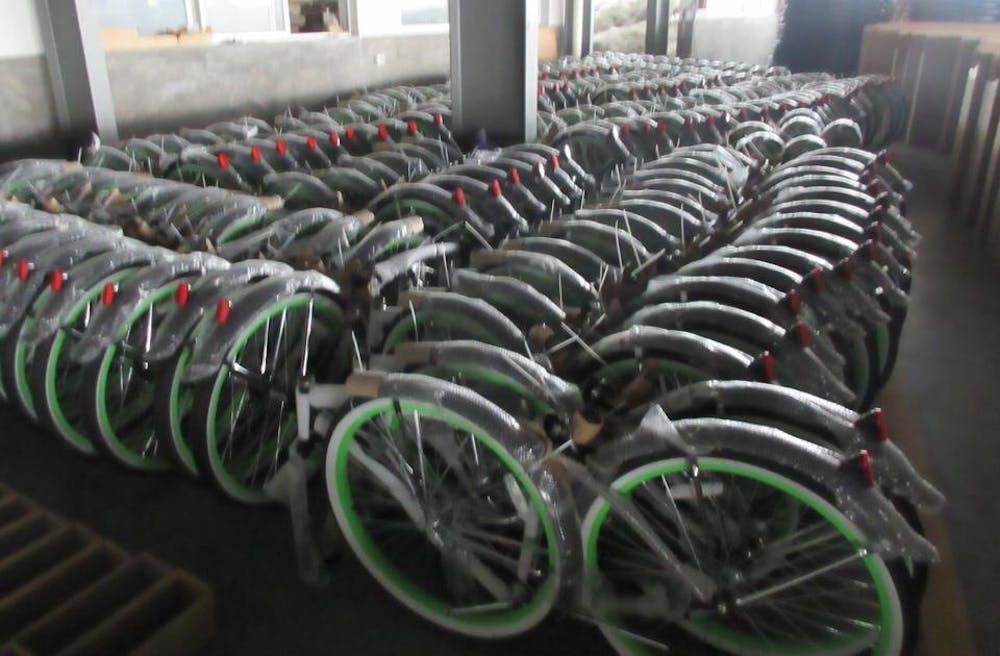For those living in Danieley Center or off-campus, getting to the hub of Elon University can be a struggle. Students can make a 20 to 30 minute trek, wait impatiently for the BioBus or ride their own bike, the more costly option.
Junior and entrepreneur Ben Kleiman hopes to bring more bike access to campuses and urban areas with his latest venture, a bike-share program called BikePass. Unlike other bike-share programs like CitiBike, BikePass does not use docking stations. Instead there are locks set up at different trees, bike racks and posts around an area.
BikePass allows users to download the app and find the green icons indicating the location of each bike on a map. After picking a bike, users type the bike ID into the app and are given a lock combination. Later, users can lock the bike up at any public locking option the area permits.
“BikePass is the first privately funded bike share system that does not utilize stations,” Kleiman said. “Our concept eliminates the hassle of finding a docking station, and through our app, makes it more flexible and user friendly.”
Although BikePass has yet to come to Elon, Kleiman sees how it can benefit campus.
“Elon is a highly populated campus with a majority of students walking to class,” Kleiman said. “The others will take their car just to travel up the street. This causes not only traffic problems, but is constantly posing parking and safety problems. By integrating BikePass at Elon we can provide economically friendly transportation, while eliminating the problems driving can cause.”

Over the summer, Kleiman discussed the possibility of bringing BikePass to campus via email with Smith Jackson, vice president for student life. He was referred to sophomore Rachel Hobbs, who is on the SGA student Concerns Committee and has been researching bike-share programs since January.
According to Jackson, Hobbs has been looking into bike-share programs by visiting Duke University to look at their program, constructing a student survey and talking with university departments. She also is incuding BikePass in the SGA feasibility study that is underway.
“Once SGA Student Concerns Committee has completed its feasibility study and discussed it with the full Senate, the administration will be interested in knowing the results as cycling fits the universities goals of healthy life styles and energy conservation,” Jackson said in an email. “So no decisions at this point, but this project is being researched.”
Kleiman has a history with business ventures and is the co-founder of the clothing companies Costal Prep Collection and Pattani Pants. He currently acts as CFO of BikePass, dealing with the financial aspects. He also acts as an expansion officer who reaches out to college campuses.
While scrolling through Facebook, Kleiman discovered the company when he saw a post by CEO and Pennsylvania State University student Adam Chain. Intrigued, he met up with Chain and immediately knew this was something he wanted to be a part of.
“BikePass uses pragmatic and innovative solutions to improve the concept of bike-sharing,” Kleiman said. “It maintains the demand for bikes while decreasing the supply, benefiting both BikePass riders and the communities it operates in.”
Chain, who founded the company, came up with the idea when he was in New York City and saw there were no CitiBike stations near the World Trade Center Memorial, but there was plenty of legal public bike parking, like benches, surrounding the memorial. From there, the idea grew to use these already available locking options for stations, and BikePass was born.
He also saw how bike-shares can benefit schools, especially sustainably focused ones like Elon.
“The benefits of decreasing demand for busses and cars on campus include less pollution, decreased bus costs and relieved congestion for schools,” Chain said. “Students also enjoy the convenience of reliable rides on-demand. I very much support every other bike share company out there because I truly believe that this concept can have a huge economical impact on the current transportation methods of condensed and highly-populated areas.”
BikePass is still in the start-up stage and has a small team with one other team leader: Connor Walsh, University of Cincinnati alum, who acts as the general manager.
So far, BikePass has only had a successful beta launch in New Jersey this summer and is now working to make agreement with universities. The management team is close to making an agreements with California State University, Long Beach and are involved in talks with New York University, Georgia State University, Miami University and Saint Joseph’s College.
The company is working to launch at larger, well-known colleges where the weather is warm year-round. From there, they will fix any problems and manage the campuses before expanding to more northern states.
According to Walsh, BikePass is an affordable option for universities. Cities are investing millions of dollars for bikes and the installation of the stations, but BikePass only charges universities $65 per bike, including the locks.
“So, the key to success isn’t figuring out if bike-sharing works, but rather a way to eliminate the long lead-time and expensive costs of implementing a bike-share system with stations, and that is what we do,” Chain said.
They are also working to make the bikes more useful for students. Their development team is working on ways the use the kinetic energy created from the front wheel to charge your smartphone while you are riding, benefits of using belt drives in place of metal chains and methods of using magnets to add momentum to every push while pedaling — all for a
better ride.
With bike-share programs gaining speed, it is becoming more likely to see BikePass riders, or a similar model, peddling around Elon’s campus or nearby urban areas.


